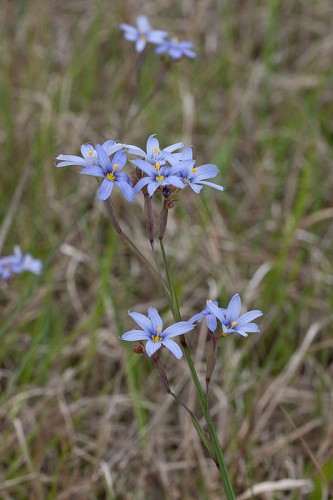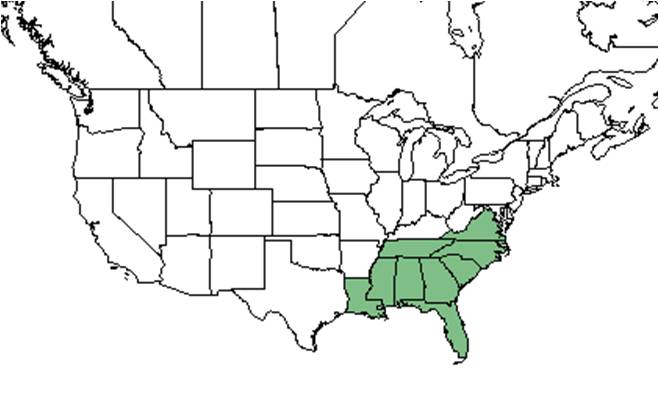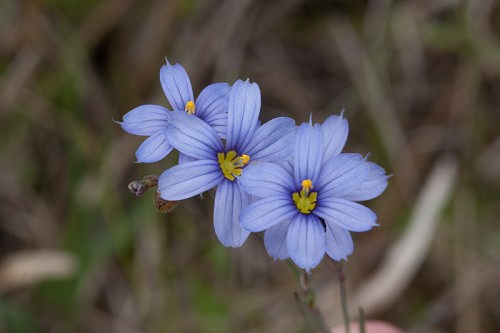Difference between revisions of "Sisyrinchium nashii"
KatieMccoy (talk | contribs) (→References and notes) |
HaleighJoM (talk | contribs) (→Ecology) |
||
| (29 intermediate revisions by 6 users not shown) | |||
| Line 3: | Line 3: | ||
{{taxobox | {{taxobox | ||
| name = Sisyrinchium nashii | | name = Sisyrinchium nashii | ||
| − | | image = | + | | image = Sisyr_nash.jpg |
| − | | image_caption = | + | | image_caption = Photo by John R. Gwaltney, [http://www.southeasternflora.com/index.asp Southeastern Flora.com] |
| regnum = Plantae | | regnum = Plantae | ||
| divisio = Magnoliophyta - Flowering plants | | divisio = Magnoliophyta - Flowering plants | ||
| Line 20: | Line 20: | ||
Common name: Nash's blue-eyed grass | Common name: Nash's blue-eyed grass | ||
==Taxonomic notes== | ==Taxonomic notes== | ||
| + | Synonym: ''Sisyrinchium fibrosum'' E.P. Bicknell | ||
==Description== | ==Description== | ||
<!-- Basic life history facts such as annual/perrenial, monoecious/dioecious, root morphology, seed type, etc. --> | <!-- Basic life history facts such as annual/perrenial, monoecious/dioecious, root morphology, seed type, etc. --> | ||
| Line 25: | Line 26: | ||
==Distribution== | ==Distribution== | ||
| + | ''Sisyrinchium nashii'' exists throughout the southeastern coastal plain, but is found primarily in peninsular Florida with disjunct populations in the Bahamas.<ref>Sorrie, B. A. and A. S. Weakley 2001. Coastal Plain valcular plant endemics: Phytogeographic patterns. Castanea 66: 50-82.</ref> | ||
| + | |||
==Ecology== | ==Ecology== | ||
===Habitat=== <!--Natural communities, human disturbed habitats, topography, hydrology, soils, light, fire regime requirements for removal of competition, etc.--> | ===Habitat=== <!--Natural communities, human disturbed habitats, topography, hydrology, soils, light, fire regime requirements for removal of competition, etc.--> | ||
| − | In the Coastal Plain in Florida and Georgia, ''S. nashii'' | + | In the Coastal Plain in Florida and Georgia, ''S. nashii'' occurs in limestone glades, longleaf pine/scrub oak communities, longleaf pine/wiregrass flats, slashpine woodlands bordering a tidal marsh, ''Cyrilla-Cliftonia'' thickets, and xeric oak/saw palmetto scrubs. Soil types include loamy sand, sand, and sandy loam.<ref name="fsu"></ref> |
| + | |||
| + | Associated species include ''Sarracenia minor, Calopogon, Schoenus nigricans, Sporobolus vaginiflorus, Dichanthelium commutatum, Polygala boykinii'', and ''Echinacea purpurea.''<ref name="fsu">Florida State University Robert K. Godfrey Herbarium database. URL: http://herbarium.bio.fsu.edu. Last accessed: November 2015. Collectors: Loran C. Anderson, Wilson Baker, M. Davis, Angus Gholson Jr., Robert K. Godfrey, Ann F. Johnson, R. Komarek, Cecil R. Slaughter, Bian Tan. States and Counties: Florida: Bay, Columbia, Duval, Franklin, Gadsden, Jackson, Leon, Liberty, Nassau, Osceola, Pasco, Wakulla. Georgia: Baker, Grady, Thomas. Compiled by Tall Timbers Research Station and Land Conservancy.</ref> | ||
===Phenology=== <!--Timing off flowering, fruiting, seed dispersal, and environmental triggers. Cite PanFlora website if appropriate: http://www.gilnelson.com/PanFlora/ --> | ===Phenology=== <!--Timing off flowering, fruiting, seed dispersal, and environmental triggers. Cite PanFlora website if appropriate: http://www.gilnelson.com/PanFlora/ --> | ||
| − | + | ''Sisyrinchium nashii'' flowers March through April<ref>Nelson, G. [http://www.gilnelson.com/ PanFlora]: Plant data for the eastern United States with emphasis on the Southeastern Coastal Plains, Florida, and the Florida Panhandle. www.gilnelson.com/PanFlora/ Accessed: 19 MAY 2021</ref> and fruits April through May.<ref name="fsu"/> | |
| + | <!--===Seed dispersal===--> | ||
| + | <!--===Seed bank and germination===--> | ||
| − | |||
| − | |||
===Fire ecology=== <!--Fire tolerance, fire dependence, adaptive fire responses--> | ===Fire ecology=== <!--Fire tolerance, fire dependence, adaptive fire responses--> | ||
| − | ''S. nashii'' has been observed growing in frequently burned longleaf pine/wiregrass communities | + | ''S. nashii'' has been observed growing in frequently burned longleaf pine/wiregrass communities.<ref name="fsu"/> Populations have been known to persist through repeated annual burning.<ref>Platt, W.J., R. Carter, G. Nelson, W. Baker, S. Hermann, J. Kane, L. Anderson, M. Smith, K. Robertson. 2021. Unpublished species list of Wade Tract old-growth longleaf pine savanna, Thomasville, Georgia.</ref> |
===Pollination=== | ===Pollination=== | ||
| − | + | ''Sisyrinchium nashii'' was observed at the Archbold Biological Station to host sweat bees such as ''Lasioglossum coreopsis'' (family Halictidae).<ref name="Deyrup 2015">Deyrup, M.A. and N.D. 2015. Database of observations of Hymenoptera visitations to flowers of plants on Archbold Biological Station, Florida, USA.</ref> | |
| + | <!--===Herbivory and toxicology===<!--Common herbivores, granivory, insect hosting, poisonous chemicals, allelopathy, etc--> | ||
| + | <!--===Diseases and parasites===--> | ||
| − | + | ==Conservation, cultivation, and restoration== | |
| + | |||
| + | ==Cultural use== | ||
| + | Historically, this species was used by the Miccosukee Indians as an analgesic and for moving sickness.<ref name="books">[[https://books.google.com/books?id=7qgPCEiI4WMC&pg=PA626&lpg=PA626&dq=Sisyrinchium+nashii&source=bl&ots=uDj07y0vSO&sig=GdSsONWAbLyGpeGgpp3Fu1xjnWE&hl=en&sa=X&ved=0ahUKEwiI2vbnwMXLAhUCWj4KHW54Dv04ChDoAQhMMAk#v=onepage&q=Sisyrinchium%20nashii&f=false}}</ref> | ||
| − | |||
| − | |||
| − | |||
| − | |||
==Photo Gallery== | ==Photo Gallery== | ||
| + | <gallery widths=180px> | ||
| + | File: Sisy_nash_JGwaltney_SEFlora-Flwr-30239_500.jpg | <center> Flowers of ''Sisyrinchium'' ''nashii'' <p> Photo by John R. Gwaltney, [http://www.southeasternflora.com/index.asp Southeastern Flora.com] </p> | ||
| + | </gallery> | ||
| + | |||
==References and notes== | ==References and notes== | ||
| − | |||
| − | |||
| − | |||
Latest revision as of 16:56, 15 July 2022
| Sisyrinchium nashii | |
|---|---|

| |
| Photo by John R. Gwaltney, Southeastern Flora.com | |
| Scientific classification | |
| Kingdom: | Plantae |
| Division: | Magnoliophyta - Flowering plants |
| Class: | Liliopsida – Monocotyledons |
| Order: | Liliales |
| Family: | Iridaceae |
| Genus: | Sisyrinchium |
| Species: | S. nashii |
| Binomial name | |
| Sisyrinchium nashii E.P. Bicknell | |

| |
| Natural range of Sisyrinchium nashii from USDA NRCS Plants Database. | |
Common name: Nash's blue-eyed grass
Contents
Taxonomic notes
Synonym: Sisyrinchium fibrosum E.P. Bicknell
Description
A description of Sisyrinchium nashii is provided in The Flora of North America.
Distribution
Sisyrinchium nashii exists throughout the southeastern coastal plain, but is found primarily in peninsular Florida with disjunct populations in the Bahamas.[1]
Ecology
Habitat
In the Coastal Plain in Florida and Georgia, S. nashii occurs in limestone glades, longleaf pine/scrub oak communities, longleaf pine/wiregrass flats, slashpine woodlands bordering a tidal marsh, Cyrilla-Cliftonia thickets, and xeric oak/saw palmetto scrubs. Soil types include loamy sand, sand, and sandy loam.[2]
Associated species include Sarracenia minor, Calopogon, Schoenus nigricans, Sporobolus vaginiflorus, Dichanthelium commutatum, Polygala boykinii, and Echinacea purpurea.[2]
Phenology
Sisyrinchium nashii flowers March through April[3] and fruits April through May.[2]
Fire ecology
S. nashii has been observed growing in frequently burned longleaf pine/wiregrass communities.[2] Populations have been known to persist through repeated annual burning.[4]
Pollination
Sisyrinchium nashii was observed at the Archbold Biological Station to host sweat bees such as Lasioglossum coreopsis (family Halictidae).[5]
Conservation, cultivation, and restoration
Cultural use
Historically, this species was used by the Miccosukee Indians as an analgesic and for moving sickness.[6]
Photo Gallery
Flowers of Sisyrinchium nashii Photo by John R. Gwaltney, Southeastern Flora.com
References and notes
- ↑ Sorrie, B. A. and A. S. Weakley 2001. Coastal Plain valcular plant endemics: Phytogeographic patterns. Castanea 66: 50-82.
- ↑ 2.0 2.1 2.2 2.3 Florida State University Robert K. Godfrey Herbarium database. URL: http://herbarium.bio.fsu.edu. Last accessed: November 2015. Collectors: Loran C. Anderson, Wilson Baker, M. Davis, Angus Gholson Jr., Robert K. Godfrey, Ann F. Johnson, R. Komarek, Cecil R. Slaughter, Bian Tan. States and Counties: Florida: Bay, Columbia, Duval, Franklin, Gadsden, Jackson, Leon, Liberty, Nassau, Osceola, Pasco, Wakulla. Georgia: Baker, Grady, Thomas. Compiled by Tall Timbers Research Station and Land Conservancy.
- ↑ Nelson, G. PanFlora: Plant data for the eastern United States with emphasis on the Southeastern Coastal Plains, Florida, and the Florida Panhandle. www.gilnelson.com/PanFlora/ Accessed: 19 MAY 2021
- ↑ Platt, W.J., R. Carter, G. Nelson, W. Baker, S. Hermann, J. Kane, L. Anderson, M. Smith, K. Robertson. 2021. Unpublished species list of Wade Tract old-growth longleaf pine savanna, Thomasville, Georgia.
- ↑ Deyrup, M.A. and N.D. 2015. Database of observations of Hymenoptera visitations to flowers of plants on Archbold Biological Station, Florida, USA.
- ↑ [[https://books.google.com/books?id=7qgPCEiI4WMC&pg=PA626&lpg=PA626&dq=Sisyrinchium+nashii&source=bl&ots=uDj07y0vSO&sig=GdSsONWAbLyGpeGgpp3Fu1xjnWE&hl=en&sa=X&ved=0ahUKEwiI2vbnwMXLAhUCWj4KHW54Dv04ChDoAQhMMAk#v=onepage&q=Sisyrinchium%20nashii&f=false}}
